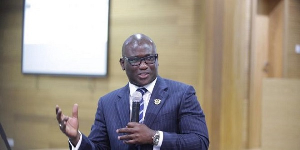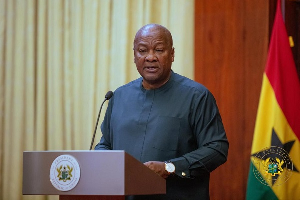On Monday, February 17, 2014, at about 0630 CST (about 1230 GMT), I received a phone call from a friend in Accra. The last time we spoke on the phone was around summer of 2013.
“Good Morning! You better wake up because this is where we need your input seriously because you like to write”
“What’s going on”? I asked with a very low and drowsy voice?
“Well, we need you to write about your former university-Legon, and advise them because they are going crazy!”
“Write about Legon”? “What do I know to talk about Legon that my former Professors and advisors don’t know?”
I was thinking it’s about the same old story of academic dishonesty, or non-transparent admission process, or another “funny news” in my former Hall which I love so much; Commonwealth Hall-a.k.a “The VANDALS”, or probably UTAG is on strike! Before she could explain herself well, I told her that I have a meeting that morning at work so I really don’t have time to deal with all these kind of “same old stories” To my surprise, before I could even finish my statement, she quickly interrupted me and said, “You’ve got it all wrong”!
In a very unusual tone, she said to me; “You might not believe this, but the truth is that ‘Legon’ is now a subsidiary of the Department of Roads and Highways. All the major roads are now toll roads”.
“You are kidding me! Right?” “Do I sound like a kid, and how many occasions have I lied to you? Unfortunately, none of your Professors see nothing wrong with that. It took me about an hour to get through that stretch of road this morning and that’s what I want you to write and advise them because they are Professors and should better”.
This person is not a stranger to Legon in all spheres. She also graduate from Legon, and was my year mate, and currently fully employed as one of the financial corporate executives in Ghana. For her to speak and chastise the university administrators and managers like this, to me was a big deal. Unfortunately, I was still wrestling with what I could write about my former professors and mentors who trained and prepared me about a decade and half ago for all the challenges of the world we live in today.
As I was driving to work that morning, all I was thinking was what advice do I have for my former Profs? Can I really write something that will make sense to them? Then I remembered what I learned in my first year MBA program in business school. One of our Finance/Business Analytics professors always used to tell us “When you are given any challenging job, do not say you can’t do it. Just go home and figure it out”! That was the greatest motivation for me at that point that led to this article, specifically designed for our Profs in Ghana.
Almost everyone is aware that higher education is facing enormous and new challenges, and how schools are coping. Shrinking or insufficient budgets and enrollment challenges, technological advances in education methodology, dwindling resources for research and development, are just some of the challenges we face in Ghana today. My purpose here is to focus on everyday operational problems in our universities and also provide the current or the future leaders with guidelines for action.
Let’s face it; higher education leaders must have both a sense of the past and a vision of the future. The world is changing rapidly and these changes will definitely have an inevitable and profound impact on higher education as we are already seeing in Ghana today. Institutions that fail to respond to the trends taking place around them will not likely survive with significance very far into this new millennium. My concern is to offer some help in making the transition from the usual “traditional Professor or Administrator” to a valued leader in our higher educational institutions.
Please, don’t get me wrong here, because, our university administrators have no easy chore. Why? Do I say so? The pervasive call for planned change in the higher academic institutions is often fiercely resisted by the valued culture in the academia itself; a culture that is weighted heavily towards preservation and maintenance of the status quo. From what I know from Legon, this is particularly true because of the belief system of faculty and administers who move from the ranks. I don’t know the situation right now, but from what I hear from colleagues and friends who took up some faculty positions few years ago, things have not changed. If the recent allegations about the toll roads fiasco are also true, then that supports my argument that things have not really changed, if not, even getting worst.
How can the university authorities secure some loan, construct or rehabilitate roads on campuses and then charge people tolls? What were the university administrators and managers thinking? I just couldn’t believe initially that this is happening on Legon campus. But now, I perfectly understand my friend’s frustrations and why so many people like her are mad at the University of Ghana authorities. The authorities have been duped, tricked, deceived, misled, swindled, fiddled, jiggled, conned, defrauded, cheated, fleeced, ripped off or whatever you may wanna call it. In fact, I’m still researching to see if I could find any university or college in the world where people pay to enter. I’ve been so fortunate enough to attend four different universities and colleges for the past decade in both Ghana and in the US. None of these colleges or universities charge people entering their campuses. Most of the Profs have various college degrees obtained in the western world and even lived and worked there for a while after school. How could this have happened? We may never know the right answer. However, I personally feel that anger and frustration played a significant role here!
As I said earlier, this whole campus toll saga has to do with the university authorities’ anger and frustrations for the fact that successive governments in Ghana have neglected the public universities far too long. Remember, that’s the behavior of African leaders. Do you think the government leaders care about Legon getting good roads? Of course, not! They only care about their welfare and how they can save at least a million dollar in a foreign account for their future use. That’s why a whole sector minister gave the university authorities the green light to proceed with such an embarrassing project, knowing that’s never done anywhere. Was the minister so ignorant to realize that public universities can’t do that? Or was it one of their usual problem solving skills?
The question of the day is; how was he able to deceive the university authorities to believe that it’s a smart idea and project to proceed? How come the Legon authorities didn’t realize that it’s not gonna work? The fact is this; ‘somebody didn’t do a good job, or did not use a good judgment! My manager always tells me, whenever I misapply my training skills, that Peter: “you used a wrong judgment here”, and that has really helped me a lot, especially in developing my soft skills. I also expect my former Professors to reflect on this and accept the fact that they have been conned, and figure out the way forward, and that will be it!
Universities are supposed to borrow money or write proposals for funding of research centers, build modern scientific Labs, indoor sports centers, state of the art computer labs, up to date libraries, scholarship programs, student’s development and career training centers, and above all, develop and expand the academic programs to meet the challenges of today’s high tech world. The university authorities have no business in playing the role of a government agency. That’s absolutely unnecessary and undependable. Some of us are worried because, we highly respect our Profs and hold them in high esteem, so we expect them to uphold and apply such standards in all their academic operations and responsibilities.
Now the question is very simple. Where were the university administrators and faculty leaders who understand lean processes when some few members decided to go for this kind of mis-appropriation of responsibility? Was this a unanimous decision? The bottom line is this; the universities need to hire business-minded and leaders who understand ‘lean’ and how to implement it. Projects have to be managed similar like in business organizations. Times have changed and the old thinking of “prestige of intellectualism” has to be rethought and go with the flow of this new millennium. It’s happening all over the world, and we must not be left behind. African leaders have failed us, and will continue to do so. The better we plan and fix our higher institutions in a holistic approach, the better. We cannot afford to follow the same old erratic ways of how our political leaders fix problems in Africa.
My Final Thought.
The public universities in Ghana must by now be thinking entrepreneurially. Let’s face it, investment in higher education is critical to every nation's success, and with funding models for public universities in Ghana changing as they have always be, it is imperative for the institutional leaders to look for new and innovative ways to do business. The university leaders will have to look at how best to show policymakers and the public that government funding and fees make up only a portion of their budget, with much of the money going to research and development. This is going to be very challenging to the authorities, because, it also means, the public would like to see the amazing work of our Profs/ researchers move from the lab to the marketplace, where it can make a real difference in people's lives. That’s the most effective way to build a strong partnerships with their community for any available financial support. To me, that is the problem of the day! They just have to figure it out!
Additionally, the university leaders should find out some kind of projects that will focus on the development of new corporate, philanthropic and state sources of support for the public higher education to ensure that public universities can continue to serve as engines of economic development and be accessible to people of all backgrounds. This is currently being done in most colleges and universities in US, and I think, such a model can also be tried in Ghana. The point is; “don’t wait or rely on these corrupt African leaders, because, they just don’t care!
We’ve never had a plethora of expectations like we have on public higher education today in Ghana. Personally, I think that’s great, because, many people see higher education as a solution to many of our problems in our society. The challenge here is that it’s unrealistic sometimes what government and the public expect the university authorities to do with less resources coming in year after year. But that should not be our excuse to embark on projects that will eventually provoke public resentment.
Personally, I think the universities need new thinking, vision and direction more than ever before. We have numerous problems and we need solutions, so please, old ways of doing things will not make us competitive at all. Let me remind you of the last stanza of one of our patriotic songs: “Yaanom, Abibirima”Yee”! That translates to mean, “When we work hard and learn from others, then we will be able to confidently join those nations which have succeeded and have been called upon to demonstrate their skills”. We must do something to safe our higher institutions, and the time and action for the new visionary youth of Africa is now! Thanks.
Peter Osei-Adjei ( poseiadjei@yahoo.com, poseiadjei20@gmail.com )
Coordinator- Web Communications
Overcoming The Power of Vested Interest Among African Youth
Opinions of Sunday, 16 March 2014
Columnist: Peter Osei-Adjei


















